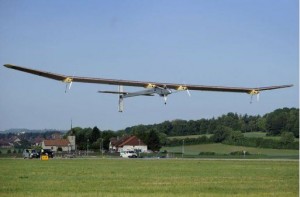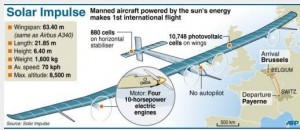
The first ever international flight of a solar-powered aircraft was successful. Solar Impulse had landed in Brussels, Belgium after 26 hours, 10 minutes and 19 seconds above Switzerland, flying at 9,235 metres (30,298 feet). The solar plane embarked from Payerne, Switzerland at around 8:40 AM (6400 GMT).
The solar plane was powered by a 12,000 solar cells that charge the batteries provide the energy for the 10-hp electric motors driving four profellers. The solar cells were located on its 64-meter wings. The speed of the aircraft was recorded at 50 kilometres (31 miles) per hour.
Solar Impulse HB-SIA holds the endurance and altitude records for a manned solar powered aircraft after completing the voyage from Switzerland to Belgium. It was also the first time when it landed in a busy airport and the coordination between the airport authorities and the pilot was crucial.

The Solar Impulse solar aircraft landed on Brussels last Thursday after completing a 24-hour test flight. The solar powered aircraft was manned by Pilot Andre Borschberg. The pilot was quoted as saying “Flying an aircraft like Solar Impulse through European airspace to land at an international airport is an incredible challenge for all of us, and success depends on the support we receive from all the authorities concerned” Borschberg said.
The solar plane made history on July 2010 as the first manned plane to fly around the clock and through the night on the sun’s energy. It covers 87 miles of airspace travel. Last year’s record-breaking flight was an achievement in demonstrating its capacity to store up enough energy.
The man behind the project, Bertrand Piccard, joint founder and president of the Solar Impulse project was quoted as saying in an interview as “This time, we have a real airplane — flying — proof that new technologies can reduce our dependence on fossil energy” said Piccard.
Bertrand Piccard was the record holder of the first man along with Briton Brian Jones to fly non-stop around the world in a balloon. He came from family of aviation pioneer Auguste Piccard and deep sea explorer Jacques Piccard.
